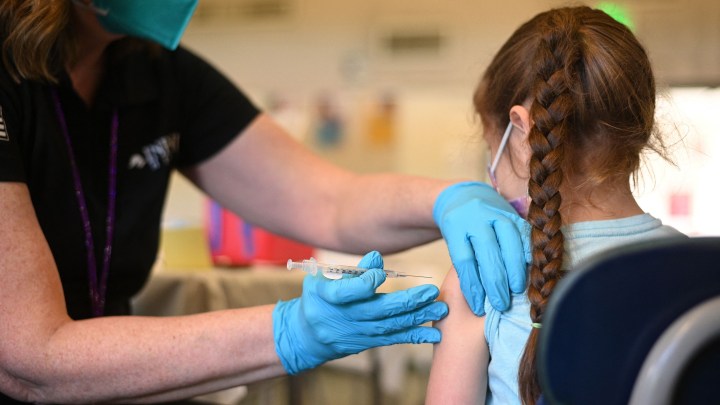
Pediatricians brace for the end of federal COVID-19 vaccine funding
Pediatricians brace for the end of federal COVID-19 vaccine funding

Federal funding for COVID-19 vaccines is running out. The government has footed the bill since the vaccines became available in late 2020. Once it steps away, COVID vaccination will be privatized. Doctors will have to pay for the vaccine doses upfront and hope that they make their money back.
That will be an especially difficult challenge for pediatricians because of the way kids’ vaccine is packaged, the variety of COVID shots pediatricians give to different age groups and the COVID vaccine’s extremely short shelf life.
Dr. Sandy Chung was getting ready to vaccinate a 4-year-old at Fairfax Pediatric Associates, her practice in Northern Virginia. Standing in a lab with vaccine freezers brushing the ceiling, Chung took out a tiny vial of the Pfizer vaccine and squinted at it.
“This vial that we have here has 10 doses in it,” she explained. By the end of the day, Chung’s practice administered 48 doses of COVID vaccine and threw out 62.
“The way it works is that once we open a vial, though, it’s only good for a few hours, and then we have to throw the rest away,” she said.

Since the federal government has been paying for the vaccine, Chung doesn’t lose any money from waste. But that will change when she has to start paying for the COVID vaccine upfront. And while the government has been paying about $30 a dose, Chung expects Pfizer and Moderna to charge her a lot more.
“Let’s just say it’s $100 a dose, potentially,” she said. “If you think about us throwing away 50 or 60 — that’s $5,000 a day that you’re asking us to throw into the trash, which is untenable. It’s just not possible.”
Moderna didn’t respond to a request for comment. A Pfizer spokesperson did, saying in an email that the company expects to have single-dose vials of COVID vaccine available early next year. Chung said that would help cut down on waste, but she would still have to pay for the vials upfront.
And it’s unclear if she’d be able to return unused vaccine for a refund, something she is able to do with some other vaccines. Tears ran down Chung’s face as she said without returns or refunds, she’ll have to stop vaccinating kids for COVID.
“To not be able to vaccinate a child against a disease — it’s heartbreaking,” she said, wiping her eyes.
But in the exam room with her patients, Chung had her game face on. She introduced herself to 4-year-old Benjamin Baccaglini, who’s here for his first COVID vaccine. As he got his shot, Benjamin clutched a stuffed animal appropriately named Dr. Bear, then ticked off his vaccine resume.
“I got three shots one day, and I didn’t even cry,” he said proudly.
But Benjamin’s mom, Shannon Baccaglini, was worried. She said if Chung stopped giving COVID shots and recommended taking Benjamin to a public clinic, she’d have to think about someone other than his pediatrician giving him his shot.
“We would always, again, go with the recommendation of his doctor, but it would take a little bit longer to come to that decision and feel comfortable,” she said.
Pediatricians and parents all over the country are grappling with these decisions. Like Chung, pediatrician Suzanne Berman in Crossville, Tennessee, won’t be able to keep giving COVID shots if she has to pay for them upfront. There’s also a lot of vaccine hesitancy in her area. Berman already has had to work hard to convince parents to vaccinate their children.
Of the small number who do allow their kids to get shots, “probably 10% to 20% would go and wait in line and get it, even if they had to go someplace else. But I think the vast majority — 80%, 90% — they just won’t get it,” she predicted.
According to Berman, 75% of her patients are on Medicaid, and many of her parents are single mothers who don’t have a way to get to a clinic or time to wait there. This is all happening as winter looms, when COVID cases are expected to spike.
“It’s going to get harder to get vaccinated at exactly the time we need more people to get vaccinated,” said Larry Levitt, executive vice president for health policy at the Kaiser Family Foundation.
And some of the public clinics pediatricians are planning to send their patients to get federal COVID funding. Once that runs out, Levitt said some of them will probably stop giving COVID shots.
There’s a lot happening in the world. Through it all, Marketplace is here for you.
You rely on Marketplace to break down the world’s events and tell you how it affects you in a fact-based, approachable way. We rely on your financial support to keep making that possible.
Your donation today powers the independent journalism that you rely on. For just $5/month, you can help sustain Marketplace so we can keep reporting on the things that matter to you.












